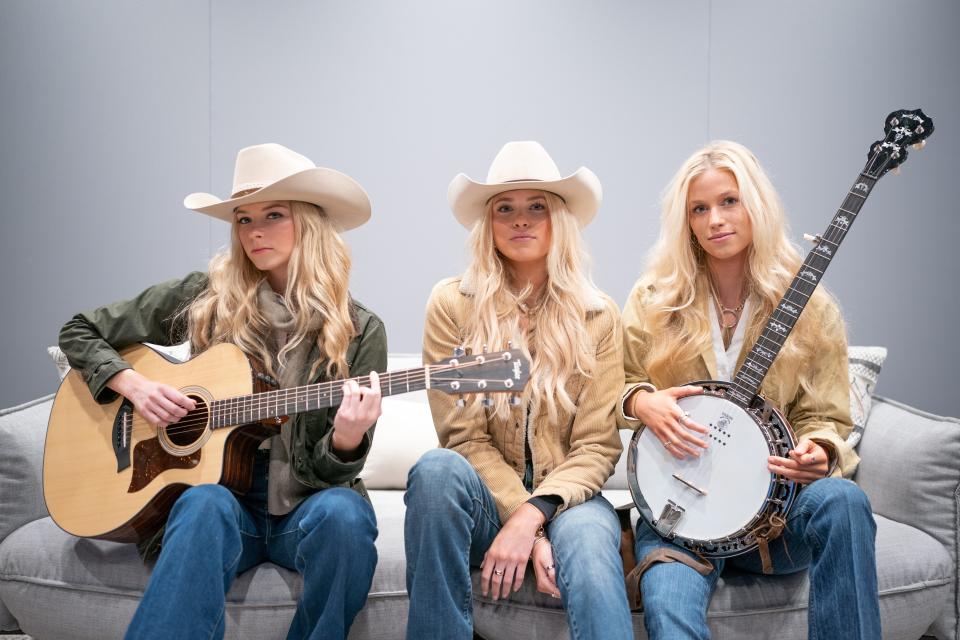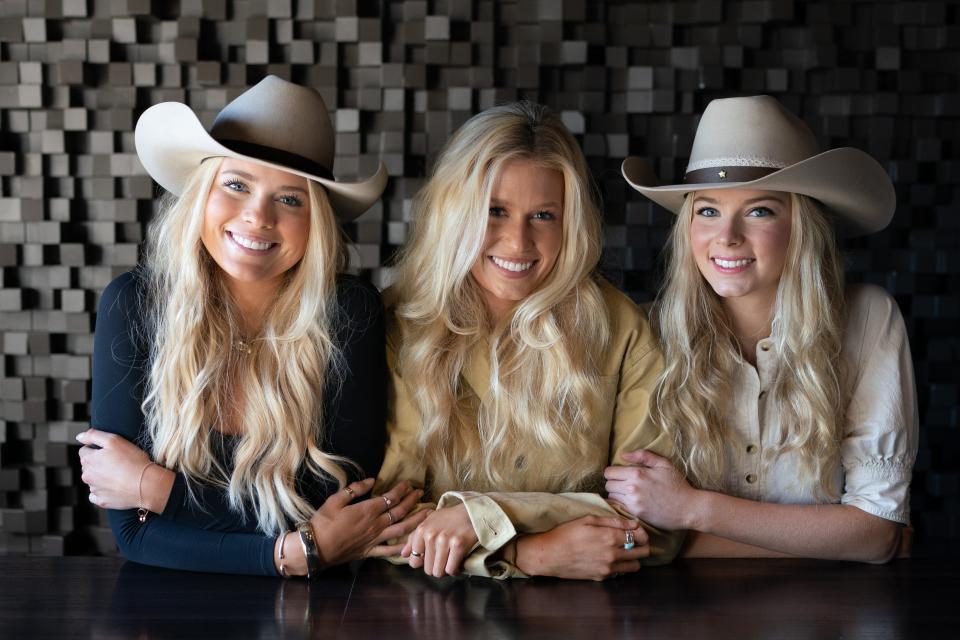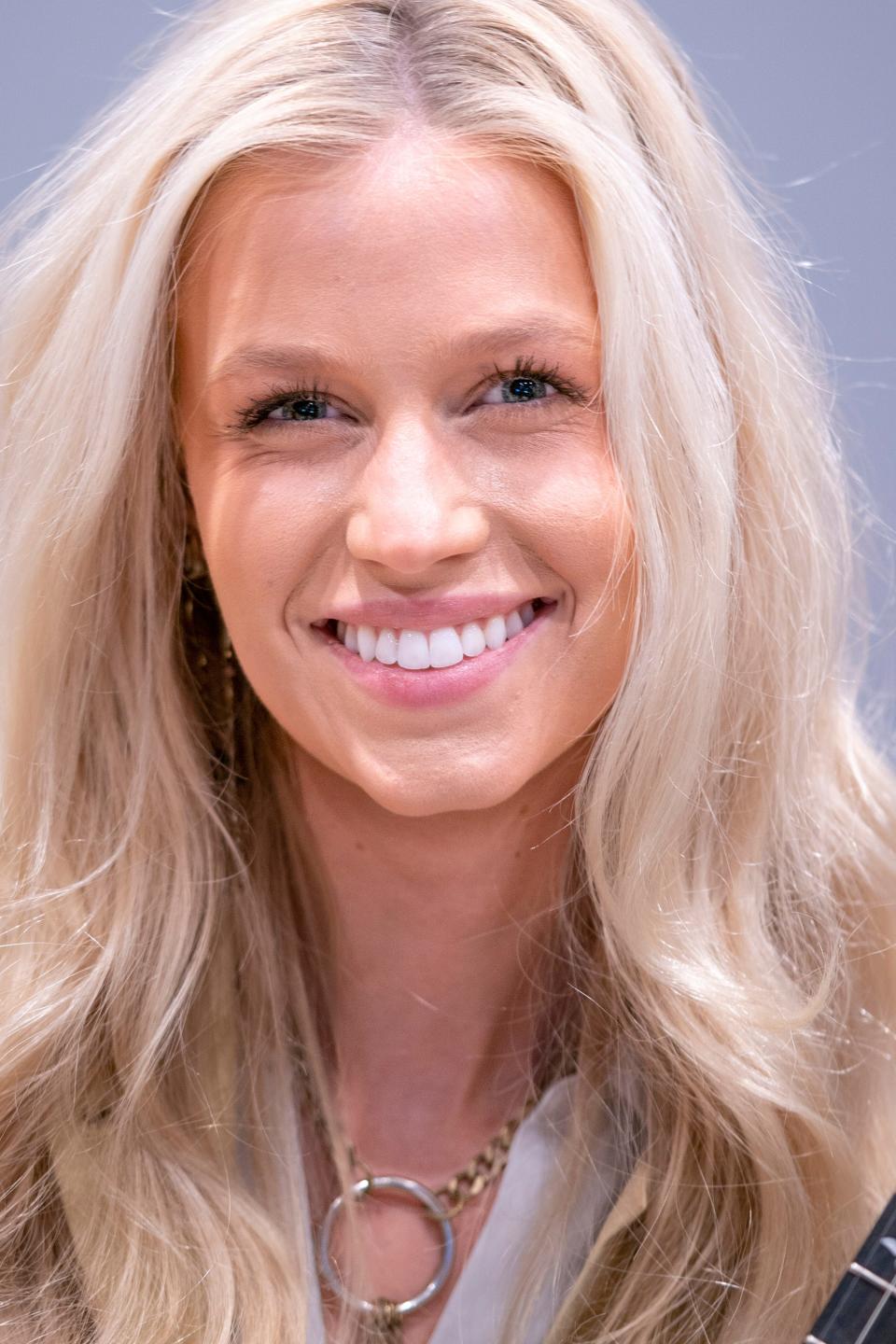The Castellows reflect women in country's mainstream bumping against a glass ceiling
On a December morning, a trio of platinum blonde sisters from the Chattahoochee River's rural Southwest Georgia banks are seated holding banjos and guitars and giggling in a Warner Music Nashville office recording studio.
Ellie, Lily and Powell Balkcom assume their family name when singing blood harmonies as The Castellows.
This story, one of three Tennessean features on artists left on the fringes of country music's latest evolution, examines their path forward in a genre struggling to integrate women in significant numbers.
The Castellows' smiles and diverse musicality rooted in 70s-era singer-songwriters and classic rock would once have put them on a direct, unfettered path to country music stardom.
It's a presentation that has drawn "too good to be true" skepticism from some Nashville industry observers.

"We're not AI clones only available on TikTok," retorts the group's lead singer, Lily Balkcom.
History offers cues to the group's potential
This year finds the genre at a place where Gabby Barrett, Katelyn Brown, Ashley McBryde, Megan Moroney, Carly Pearce, Mackenzie Porter, and Lainey Wilson have all achieved chart-topping country music radio status since 2020. However, it still feels that achieving the pinnacle of stardom for women in country music is more challenging than ever before.
Warner Music Nashville's co-chair and co-president Cris Lacy believes the group can achieve success based on their "captivating, genuine and original" combination of "sibling harmony and musical prowess."
Four decades have elapsed since a series of female country groups, including Barbara Mandrell and the Mandrell Sisters, The Judds, The Forester Sisters and the trio of Emmylou Harris, Dolly Parton and Linda Ronstadt all achieved stardom throughout the 1980s.
And yes, The Chicks, before running afoul of country music's conservative norms, had six No. 1's (including generational genre classics like "Cowboy Take Me Away," "Goodbye Earl" and "Wide Open Spaces") by 2002.

In the 1980s, America's broadest middle-class era ever allowed country music the ability to double down on its roots and support acts like Alabama, Kenny Rogers, George Strait, Randy Travis and eventually Clint Black, Garth Brooks, Alan Jackson and Travis Tritt as well as the female acts mentioned above.
But unlike the 1980s, the Castellows have to find their place in a narrower, more male-defined, country music landscape.
Family-first artists singing the truth
"We're writing about loving our family first because we grew up homeschooled on a cattle farm and haven't dated too much," jokes Lily, 19.
Eleanor, 18, continues that her passion for telling familial stories is tied to country music's core interests, plus their father's multigenerational tie to seven square miles of land.
The first track they released after being signed to Warner was "No. 7 Road." Co-written with award-winning songwriter Hillary Lindsey, it's an autobiographical ode to being rooted on backroads their grandfather walked barefoot as a child.
"Sitting with her taught us the importance of how the small details matter -- our grandfather liked sitting on a back porch swing. Yeah, it might sing better [otherwise], but that's not true. "The truth in lyrics connects better," adds Eleanor's twin sister Powell.

Eleanor, Powell, and their brother, Henry Balkcom, are triplets. Lily was born 17 months later.
The Castellows were still in diapers when Lindsey won a Grammy for Carrie Underwood's "Jesus, Take The Wheel" in 2005 and were glimmers in the eyes of their mother, Claudia, and father, Pataula Judicial District Superior Court Judge Henry Balkcom IV, when The Chicks were achieving radio hits in the late 1990s.
That perspective defines their wide-eyed artistic fearlessness.
New Castellows music unveils star-making narratives
Lily is the youngest but has the most assertive personality and voice. Thus, she often takes the lead vocals. Eleanor's voice is a natural multi-octave soprano, leaving Powell to assume alto parts. Their skill at instruments arrived from music being their extra-curricular homeschool activity.
Eleanor has been a pianist for a decade and a guitarist and mandolin player for roughly half as long as Powell, who also plays the banjo. Lily is now a lead singer who plays the bass guitar, filling out the trio's instrumental bona fides.
Among their new songs is a cover of Levon Helm's 1980-released rootsy rock single "Hurricane."
They've only recently traveled to the 24-mile bridge over New Orleans' Lake Ponchatrain for the first time to shoot a music video for the track.
The story of a man from Chicago not trusted to effectively erect a levee to stop what's famously described as "high black water, a devil's daughter," hard, cold, mean and aiming at washing away New Orleans may not be a story they intrinsically know. Still, it is one that they have the vocal tonality to inhabit uniquely.
While excitedly streaming "a world of music" on Spotify when she was given her first smartphone at 14, Powell immediately became a fan of the darker chords in "Hurricane."
A recent edition of CMT's digital short series "Make It Country" digs to the deepest point yet of the group's dynamic ability to meet decades-past standards of stardom for female country groups.
Because they're homeschooled and while attending the University of Georgia, focused mainly on academics, when presented with a list of non-country pop songs to cover, the only song that The Castellows remotely knew was a fascinating one:
Korean pop girl group BLACKPINK's 2020-released global smash "How You Like That."
Eleanor is a self-described "big nerd" gaining fluency in English, Latin and most recently, Korean.
The performance crystallizes the moment The Castellows are having and how they're developing their unique brand of sustainable stardom.
To that end, Powell Balkcom adds a definitive thought.
"By writing what we want to write and singing what we want to sing, we plan on being in Nashville for a long time."
This article originally appeared on Nashville Tennessean: The Castellows: Women in country music mainstream are at crossroads
